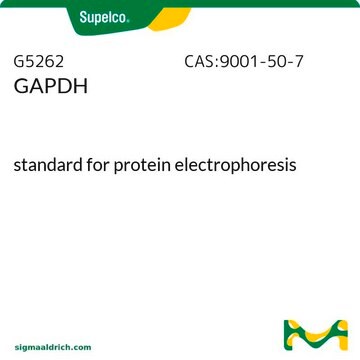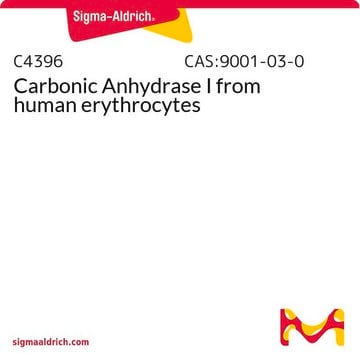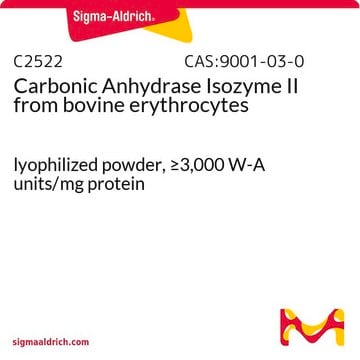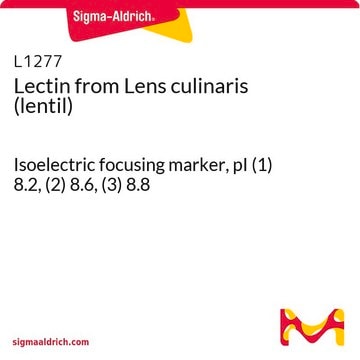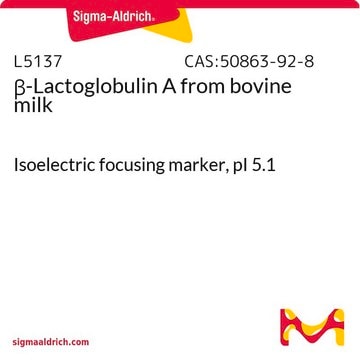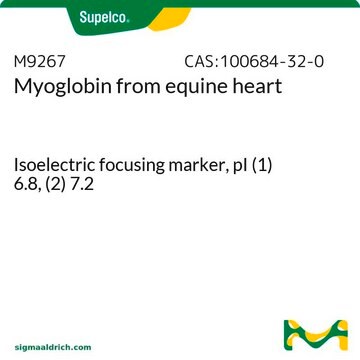C6653
Carbonic Anhydrase I from human erythrocytes
Isoelectric focusing marker, pI 6.6
Synonym(s):
Carbonate Dehydratase, Carbonate Hydrolyase, Carbonic Anhydrase Isozyme I
Sign Into View Organizational & Contract Pricing
All Photos(1)
About This Item
Recommended Products
Looking for similar products? Visit Product Comparison Guide
Related Categories
Application
Carbonic Anhydrase I from human erythrocytes has been used as a pI (isoelectric point) marker in two-dimensional gel electrophoresis.
Biochem/physiol Actions
Carbonic Anhydrase I from human erythrocytes is a protein which is used as a standard pI (isoelectric point) marker for isoelectric focussing experiments.
Signal Word
Danger
Hazard Statements
Precautionary Statements
Hazard Classifications
Resp. Sens. 1
Storage Class Code
11 - Combustible Solids
WGK
WGK 3
Flash Point(F)
Not applicable
Flash Point(C)
Not applicable
Personal Protective Equipment
dust mask type N95 (US), Eyeshields, Gloves
Certificates of Analysis (COA)
Search for Certificates of Analysis (COA) by entering the products Lot/Batch Number. Lot and Batch Numbers can be found on a product’s label following the words ‘Lot’ or ‘Batch’.
Already Own This Product?
Find documentation for the products that you have recently purchased in the Document Library.
Customers Also Viewed
The focusing positions of polypeptides in immobilized pH gradients can be predicted from their amino acid sequences.
Bjellqvist B, et al.
Electrophoresis, 14, 1023-1031 (1993)
Two-dimensional gel isoelectric focusing.
Stastna M and Slais K
Electrophoresis, 26, 3586-3591 (2005)
Forskolin and camptothecin induce a 30 kDa protein associated with melatonin production in Y79 human retinoblastoma cells.
Janavs JL, et al.
The Journal of Neuroscience, 15, 298-309 (1995)
Yuzhu Bian et al.
Artificial cells, nanomedicine, and biotechnology, 41(1), 60-68 (2013-01-26)
Even though erythrocytes transport both oxygen and carbon dioxide, research on blood substitutes has concentrated on the transport of oxygen and its vasoactivity and oxidative effects. Recent study in a hemorrhagic shock animal model shows that the degree of tissue
Alessio Papi et al.
PloS one, 8(1), e54968-e54968 (2013-02-02)
Cancer stem cell biology is tightly connected to the regulation of the pro-inflammatory cytokine network. The concept of cancer stem cells "inflammatory addiction" leads to envisage the potential role of anti-inflammatory molecules as new anti-cancer targets. Here we report on
Our team of scientists has experience in all areas of research including Life Science, Material Science, Chemical Synthesis, Chromatography, Analytical and many others.
Contact Technical Service


